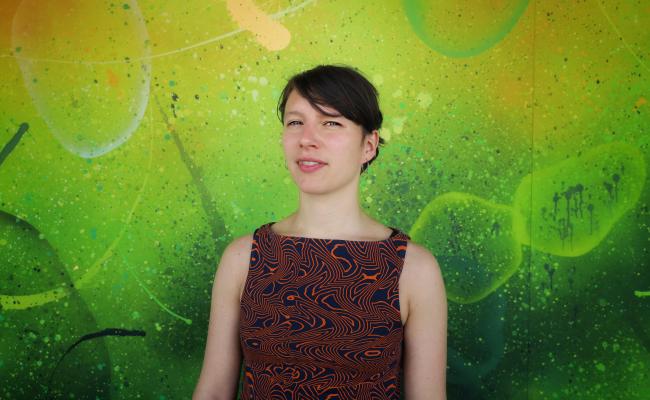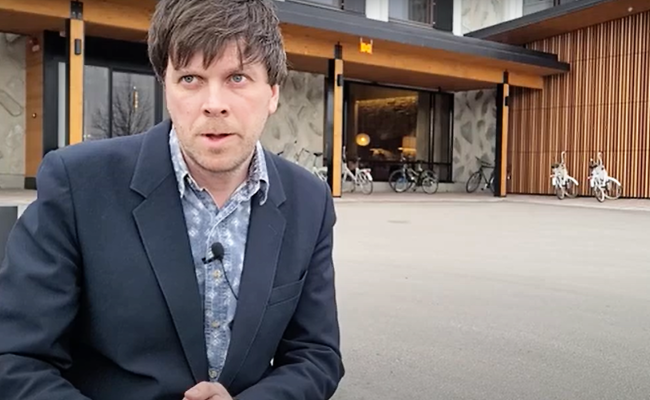Continued Enthusiasm for Barents Cooperation
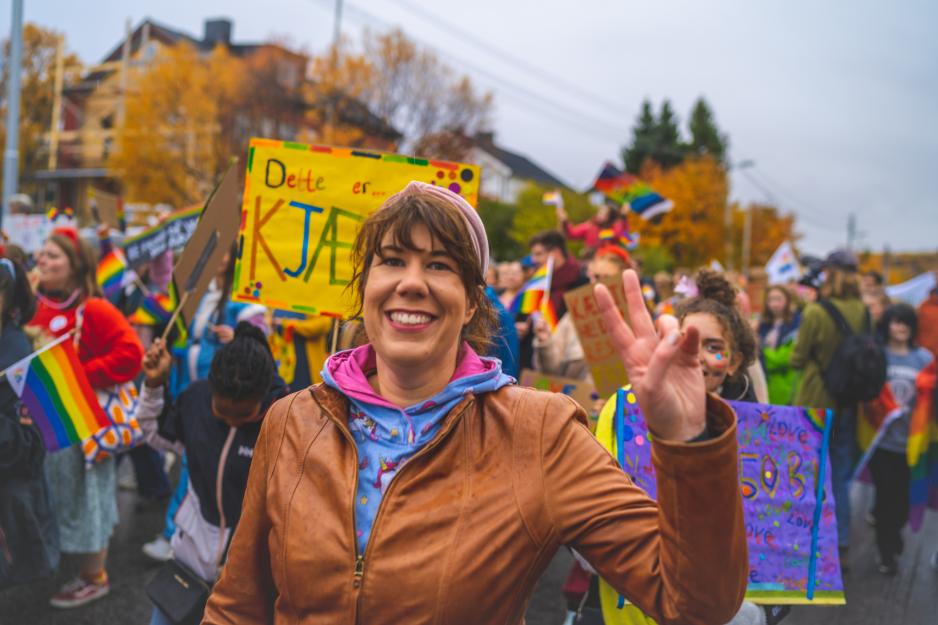
Marit Jacobsen, Deputy Head of The Norwegian Barents Secretariat in Kirkenes, at last year's Barents Pride in Kirkenes. The celebration on the border between west and east is organized by FRI Sør-Varanger with support from the secretariat. (Photo: Ksenia Novikova/The Norwegian Barents Secretariat)
Barents Press, Barents Games, and Barents Pride. These are some of the Norwegian-Russian cooperation structures which live on through enthusiasts and The Norwegian Barents Secretariat's support, says Marit Jacobsen, its Deputy Head.
"Behind our current projects are people who are incredibly passionate about cooperation in the Barents region, like independent artists and journalists. They have a great need for cross-border contact and are able to meet despite many challenges," says Marit Jacobsen.
Jacobsen is the Deputy Head of The Norwegian Barents Secretariat in the border town Kirkenes, which supports Norwegian-Russian interaction in the Barents region. More specifically, it facilitates Norwegian-Russian cooperation projects through funding, sharing of knowledge, and networking.
The secretariat is a part of the Barents cooperation between mainly Russia, Norway, Finland, and Sweden. It was established in 1993, with the aim of promoting trust, interaction and dètente, across the borders in the North after the Cold War.
The new old conflicts between west and east - accompanied by national Russian restrictions on civil society and the COVID pandemic - have affected also this Northern cooperation in later years. However, the major divide came with Russia's hot war against Ukraine.
In March, all activities with the official Russia within the Barents cooperation were suspended. Consequently, the Norwegian Barents Secretariat has put projects involving Russian municipal, regional and state agencies on hold. But the Norwegian-Russian people-to-people cooperation lives on, even in a demanding time.
Ensuring the possibility for future cooperation
Cooperation with Russian individuals and independent organizations can still receive funding from the Norwegian Barents Secretariat. The secretariat has also made adjustments in their requirements for projects.
"We have changed our guidelines, so that we can support projects which involves Russian participants who have left Russia. For example, we supported the media conference of the Barents Press network, which was organized in Joensuu in Finland in May. Journalists from all four Barents countries participated, including Russians who had emigrated to the Baltics and other European countries after the war. A few Russians also travelled to the conference from Russia," says Jacobsen and continues:
"The journalists in this networks know each other so well and simply need to have that dialogue. The conference program was also very good. All in all, a very good project!"
The secretariat has also taken steps to ensure frameworks for future interactions.
"By changing the guidelines, we are also able to support projects that are contributing to the maintenance of established cooperation strucures in cases where the Russian partner is currently unable to participate. An example is the Barents Games, an annual olympics for youth in the Barents region, which is going to be held in Tromsø in September without Russian participation."
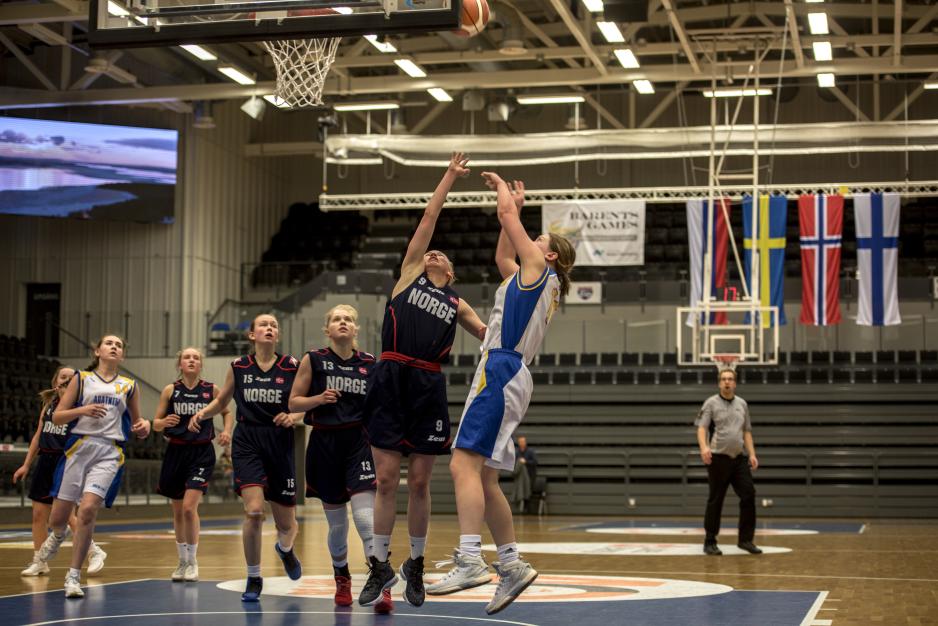
The Barents Games are held annually between the Barents countries, and alternate between summer and winter versions. Here from the Barents Winter Games 2018 in Luleå, Northern Sweden. This fall, the Barent Summer Games is held in Tromsø without Russian participation. (Photo: Jonas Karlsbakk/The Norwegian Barents Secretariat)
We have a bit of a fight with Arctic Pride in Tromsø about which of the Pride celebrations is the northernmost in the world.
Something to celebrate
This fall, Barents Pride will also be organized in Kirkenes by FRI Sør-Varanger with the support of the Norwegian Barents Secretariat.
After Russia removed their COVID-related travel restrictions in July, it will finally be feasible for Russians to come across the border for this celebration of queer love and diversity, says Jacobsen.
"We have a bit of a fight with Arctic Pride in Tromsø about which of the Pride celebrations is the northernmost in the world," she laughs, who herself is a regular participant of the border town's parade.
Speaking of mobility: An exciting new exchange project within higher education is now underway in the secretariat's portfolio.
"In the area of education, we have usually given a lot of support to Barents Plus, which is an exchange program for students and employes at Norwegian and Russian universities in the region. All these Russian institutions are public and thus covered by the sanctions," says Jacobsen and goes on:
"At the same time, there are possibilities within exchange. We have now given our support to "free movers" with Sami background from the county of Murmansk. They are not affiliated with any public Russian educational institution, and will be studying Sami language and culture at the Sami University in Kautokeino. We are trying to focus on these types of independent actors."
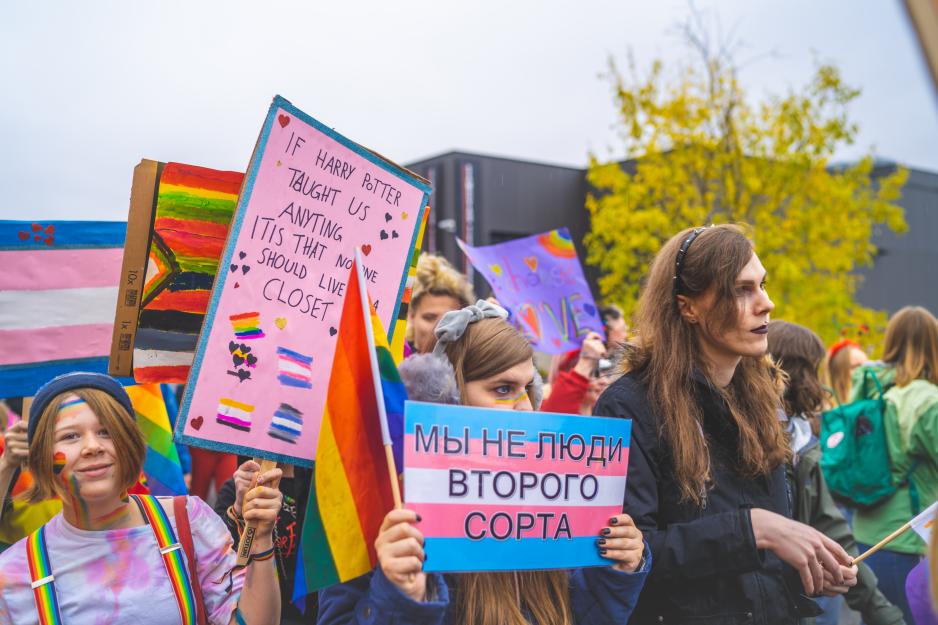
After two years of COVID restrictions, it is now possible for Russians to again cross the border to participate in Barents Pride in Kirkenes. Мы не люди второго сорта - Russian for "We are not second-class citizens" - was among the slogans on the posters during Barents Pride 2021. (Photo: Ksenia Novikova/The Norwegian Barents Secretariat)
Many obstacles in the way of cooperation
Before the Russian travel restrictions were lifted, Russian project participants have, for example, had to use the Murmansk-Istanbul-Oslo-Kirkenes route.
Although it has become easier to use the Borisoglebsk-Storskog border crossing in the High North, there are several other challenges for the execution of Norwegian-Russian cooperation.
"Since the war, The Norwegian Ministry of Foreign Affairs has advised against all travelling to Russia. If one travels there, one's insurarance is no longer valid and bank cards cannot be used. The same goes for Russians travelling to Norway. In addition, I have the impression that the waiting time for visas have become much longer," says Jacobsen.
As is known, several Russian banks are banned from the international payment system Swift. Jacobsen also knows that some Norwegian banks have apparently introduced their own sanctions against Russia, and refuses to carry out monetary transactions to the country.
This means that the project owners on the Norwegian side, who are recipients of funds from the Norwegian Barents Secretariat, face significant obstacles when it comes to money transfers to the Russian side - for example, to pay someone for work they have done.
"This creates complicated situations for the project owners. In some cases, it can get to a point where there are so many issues that cooperation is made impossible."
We are concerned with both creating and being present at various meeting places.
Meetings in art and culture
As High North News has previously reported, the collective of curators and producers Pikene på Broen in Kirkenes are familiar with the aforementioned problem.
However, Pikene på Broen are still able to continute the interaction with independent art and cultural actors in Russia - with great support from the Norwegian Barents Secretariat as financer and center of competence.
This summer, the secretariat and the collective co-organized a live-streamed debate titled "Bridge over troubled waters," which focused on cooperation with Russia in the future.
The debate was held in connection to the Arctic Arts Summit, which was organized in Whitehorse, Yukon, in northwest Canada. This is a gathering for representatives for the Arctic countries and the Arctic indigenous people to strengthen Northern art and culture.
For this year's gathering, the Norwegian Barents Secretariat presented its experiences with cross-border cooperation, as well as seven projects during BarentsKult - a funding program for major art and culture projects in Norwegian and Russian parts of the region.
"We are concerned with both creating and being present at various meeting places for exchange and discussion. Going forward, we will look at what other initiatives we would like to take throughout the fall," says Jacobsen.
High North News meet her after she had taken part in a debate on Norwegian-Russian cultural cooperation and sanctions, organized by the Nordland Music Festival in Bodø.
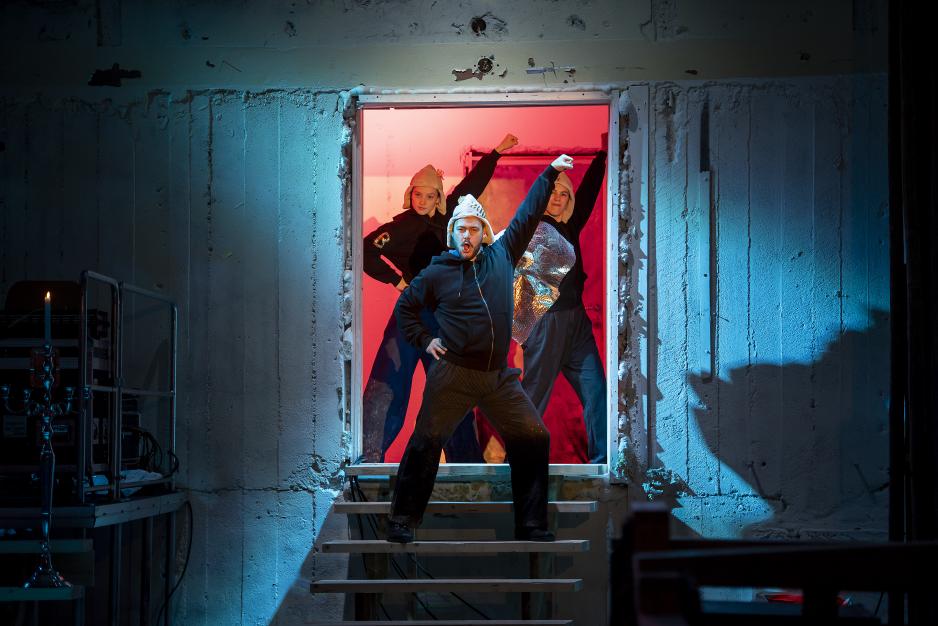
The Samovar Theatre in Kirkenes was among the projects which the Norwegian Barents Secretariat presented at the Arctic Arts Summit in Canada. This is the northernmost professional theatre, named after the Russian tea kettle samovar (самовар). Here from the show "Sett ditt hjerte mot mitt" (Put your heart against mine) during the theatre's 30th anniversary in 2020. (Photo: Jonas Sjøkvist Karlsbakk/ The Barents Sekretariat)
We have had to send humanitarian help to Kharkiv and Uzjhorod.
Inspiration and support for other countries
The Norwegian Barents Secretariat also share their border expertise beyond an Arctic framework.
"We participate in border-crossing cooperation in other parts of Europe through EEA Agreement. The secretariat is involved in regional projects between Ukraine and Slovakia, among other things," says Jacobsen and goes on:
"This May, I took part in a visit to the border area between these countries. On the Ukrainian side, there are very difficult conditions. We have simply had to send humanitarian help to our partner organizations in the cities of Kharkiv and Uzjhorod."
As the review above suggests, the Norwegian Barents Secretariat has relevant expertise and a diverse portfolio of projects to keep busy with, even after the upheavals following Russia's invasion of Ukraine.
It’s up to the MFA whether it wants to give us another mandate or say ‘thank you and goodbye’.
The future?
Some are, however, questioning the Norwegian Barents Secretariat's basis of existence after Russia's warfare in its neighbouring country and new authoritarian moves against its own civil society. This spring, a debate on the secretariat's results and future was held.
"The Norwegian Barents Secretariat is a failure" and "must be discontinued in its present form", Nordlys, a newspaper in Northern Norway, wrote in an editorial. That the secretariat have failed in promoting democracy on the Russian side, and that Russia has written off the Barents cooperation and all interaction with the West, are among its arguments.
"We receive mandates from the Norwegian Ministry of Foreign Affairs, which is funding the greater parts of our activities, and we have to comply with those mandates. It’s up to the MFA whether it wants to give us another mandate or say ‘thank you and goodbye’,'" says Jacobsen and continues:
"This June, we had a good meeting with the ministry's State Secretary, where we discussed future issues. The MFA has not signalled in any way that the secretariat might have to be closed, but rather expressed that Russian expertise is not to be reduced."
"So far, the ministry has only given instruction to think about what we can support, and that we must evaluate the secretariat if it comes to a point where virtually no cooperation projects are possible," she says.
If Finland and Sweden become members of NATO, then it will open up for more civil cooperation.
Looking towards Finland and Sweden
As an alternative to closing down, Nordlys suggested, among other things, an upheaval of the secretariat's activities to rather support cooperation with Finland and Sweden. A stronger turn in the direction of these countries may be relevant, according to Jacobsen.
"In the meeting, the State Secretary pointed out that if Finland and Sweden become members of NATO, then it will open up for more civil cooperation with them. In many of our projects, these two countries are already important partners, for example in Barents Press and Barents Games."
"At the same time, it is important to note that the secretariat's central task from the beginning has been to finance also Russian participation in projects, based on the large socio-economic differences between Norway and Russia. There are no such differences between Norway, Finland, and Sweden," she adds.
How the future can be shaped from the present time, is to be discussed by Jacobsen and her colleagues.
"This fall, we will really look at how things can be done in the long term."
Also read
This article was originally published in Norwegian and has been translated into English by Birgitte Annie Molid Martinussen.


